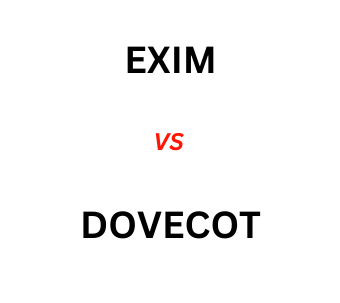If we’re setting up a new server or updating its software, it’s better to have an understanding of Exim vs Dovecot. At Bobcares, with our Server Management Services, we can handle your server-related issues.
Exim vs Dovecot
Mail transfer agents (MTAs) like Dovecot and Exim are frequently seen on Linux systems. They offer users services including email delivery, storage, and retrieval. Both MTAs do comparable tasks and fulfill different roles in an email server.

Exim
It is a C-based open-source mail transfer agent. Some Linux distributions, including CentOS and Red Hat Enterprise Linux, use it as their default MTA. It also handles millions of emails each day and is extremely flexible and expandable. Exim also offers a number of security measures, such as IP-based rate limitation and TLS/SSL. Additionally, it offers plugin modules, allowing us to customize its functionality to meet specific requirements.
Installation: It is open-source software. We can install using the below codes:
For CentOS server:
sudo yum -y install eximDovecot
It is a free tool that offers the POP3/IMAP service protocol for mail account login. It is a scalable, highly flexible solution with a security and dependability focus.
Installation: It is open-source software. We can install using the below codes:
For CentOS server:
sudo yum install dovecot -yExim vs Dovecot – Architecture & Protocols Used
Both of the MTAs use their own procedures. Dovecot supports the IMAP and POP3 email protocols, enabling users to access their mailboxes. Exim is a mail transport agent (MTA) that takes mail from clients, transmits it to mail servers, and also receives mail from other servers.
Exim uses SMTP-TCP, whereas Dovecot uses the IMAP and POP3 for client communication. For both incoming and outgoing emails, Exim employs a single mechanism. IMAP and POP3 are the email retrieval protocols in Dovecot. Exim sends emails over SMTP. The protocols IMAP and POP3 provide for remote access to and retrieval of server-stored emails. The rule used by the server to deliver emails is called SMTP.
[Looking for a solution to another query? We are just a click away.]
Conclusion
Excellent open-source software options for email servers include Dovecot and Exim. Their designs and protocols differ, but their functionalities are fairly similar.
PREVENT YOUR SERVER FROM CRASHING!
Never again lose customers to poor server speed! Let us help you.
Our server experts will monitor & maintain your server 24/7 so that it remains lightning fast and secure.







0 Comments